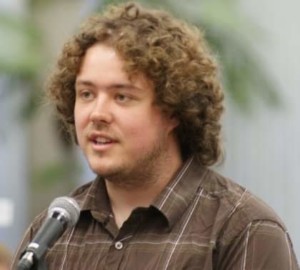
Alex Uzdavines was born in San Diego, CA and existed for a number of years before deciding to pursue Psychology after taking most of the coursework in it offered by the San Diego Community College District. He transferred to and earned his BA in Psychology and Social Behavior and MA in Demographic and Social Analysis from the University of California, Irvine. He is a Clinical Psychology graduate student in the Department of Psychological Sciences at Case Western Reserve University, working under Professor Julie Exline. His primary research interests are in the psychology of (non)religion and (non)spirituality, with an emphasis on studying how (non)beliefs contribute to spiritual struggles and well-being.
Most of the health psychology of religion sub-sub-field suffers less from a God-shaped hole and more of a God-shaped elephant sitting in the room that usually goes undiscussed. The most important, but always implicit, mechanism in these studies is God.
Author’s cat demonstrating the utility of having an overarching framework for discussing topics pertinent to religious studies within interdisciplinary contexts. Trying to squeeze “(non)religious and/or (non)spiritual identifications, beliefs, and/or practices are important to [psychology topic] because…” into a 150-word abstract for a conference paper is cumbersome, at best.
Author's cat providing pictorial representation of “‘Unbelief’: comfortable enough for now, probably need to move away from it eventually” For the past few years, the term “unbelief” has made me academically disquieted in a way I’ve never quite been able to place.
The International Association for the Psychology of Religion (IAPR) 2015 World Congress was held on August 17th-20th. Conference report for The Religious Studies Project by Alex Uzdavines, a PhD student at Case Western Reserve University. The International Association for the Psychology of Religion (IAPR) 2015 World Congress was held on August 17th-20th. Conference report for The Religious Studies Project by Alex Uzdavines, a PhD student at Case Western Reserve University.
In this interview, Dr. Julie Exline discusses what led to her interest in Struggles and some of the background behind the development of the Religious and Spiritual Struggle Scale. She goes on to talk about why the scale includes struggles relevant to both religious believers and nonbelievers and how this work related to some of her current work on god images in both groups.
Those of us within psychology of religion who study secularity are privileged to be working in a time where secular beliefs and nonbelievers are starting to be taken seriously within the field as a whole. The Religious Studies Project interview with Dr. Luke Galen conducted by Tommy Coleman was an excellent cross-section of some of the a long way to go in figuring ...
In this hard-hitting report, Alex Uzdavines reflects on the highs and lows of his recent experience at the American Psychological Association Division 36 Society for the Psychology of Religion and Spirituality 2015 Mid-Year Conference hosted by Brigham Young University (BYU) in Provo, Utah, United States on March 20th and 21st 2015.
This work is licensed under a Creative Commons Attribution- NonCommercial- NoDerivs 3.0 Unported License.
The views expressed in podcasts, features and responses are the views of the individual contributors, and do not necessarily reflect the views of The Religious Studies Project or our sponsors. The Religious Studies Project is produced by the Religious Studies Project Association (SCIO), a Scottish Charitable Incorporated Organisation (charity number SC047750).